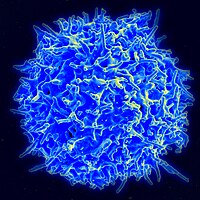
Photo from wikipedia
The efficacy of T cells depends on their functional avidity, i. e., the strength of T cell interaction with cells presenting cognate antigen. The overall T cell response is composed… Click to show full abstract
The efficacy of T cells depends on their functional avidity, i. e., the strength of T cell interaction with cells presenting cognate antigen. The overall T cell response is composed of multiple T cell clonotypes, involving different T cell receptors and variable levels of functional avidity. Recently, it has been proposed that the presence of low avidity tumor antigen-specific CD8 T cells hinder their high avidity counterparts to protect from tumor growth. Here we analyzed human cytotoxic CD8 T cells specific for the melanoma antigen Melan-A/MART-1. We found that the presence of low avidity T cells did not result in reduced cytotoxicity of tumor cells, nor reduced cytokine production, by high avidity T cells. In vivo in NSG-HLA-A2 mice, the anti-tumor effect of high avidity T cells was similar in presence or absence of low avidity T cells. These data indicate that low avidity T cells are not hindering anti-tumor T cell responses, a finding that is reassuring because low avidity T cells are an integrated part of natural T cell responses.
Journal Title: Frontiers in Immunology
Year Published: 2019
Link to full text (if available)
Share on Social Media: Sign Up to like & get
recommendations!